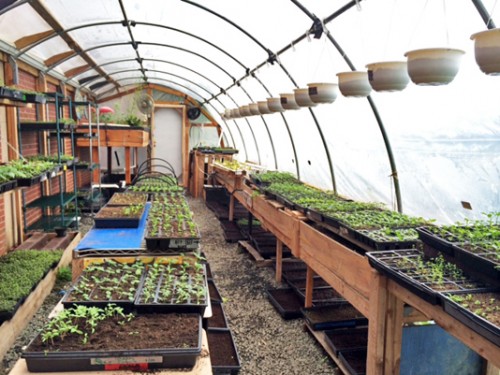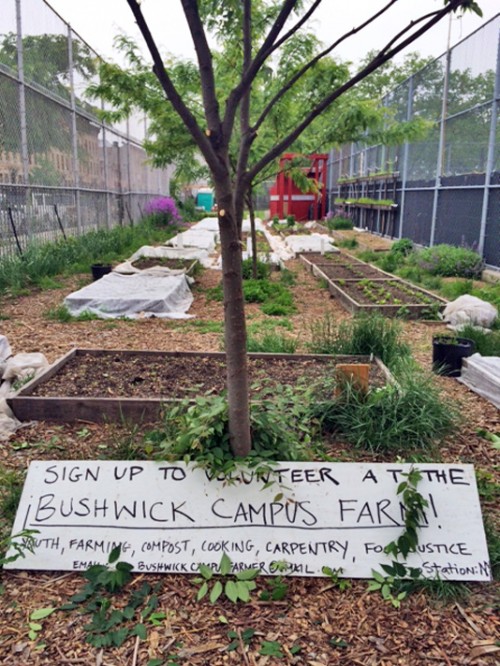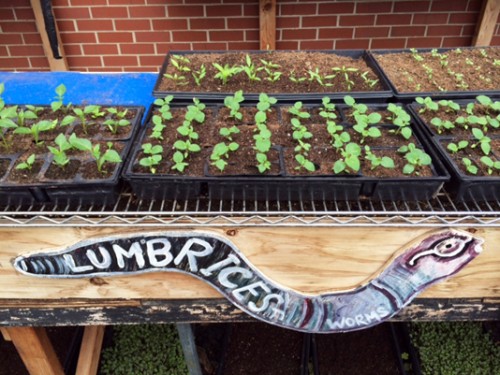 Chef Aaron Sanchez and WhyHunger visit EcoStation:NY and Bushwick Campus Farm (Photo by Diane Bondareff for WhyHunger)
Chef Aaron Sanchez and WhyHunger visit EcoStation:NY and Bushwick Campus Farm (Photo by Diane Bondareff for WhyHunger)
The 2014 WhyHunger Chapin Awards, “Hope to End Hunger,” is coming up on June 3! This year, youth from EcoStation:NY will be building an onsite farm installation inside the Hard Rock Cafe at Times Square. EcoStation:NY’s Bushwick Campus Farm is a living classroom and dynamic model of urban agriculture education located on the grounds of the four high schools of Bushwick Campus in Brooklyn, NY. Youth volunteers from the farm will be giving a special keynote at the awards dinner. We asked two student volunteers to tell us how working on the farm has impacted their lives; see the interview below to read their responses.
The event is a celebration of those making a difference in the fight against hunger and poverty and will feature live performances by Artists Against Hunger & Poverty partners Blurred Vision, Martha Redbone and our ASCAP Harry Chapin Humanitarian Award winner, The Fab Faux. Enjoy a new menu with fresh ingredients sourced from some of our grassroots partners, delicious cocktails, an array of passed hors d’oeuvres and international food stations. To purchase tickets to the Hope to End Hunger awards dinner, click here.
Special thanks to Maggie Cheney for her assistance with this interview.
 Inside the greenhouse at EcoStation:NY’s Bushwick Campus Farm.
Inside the greenhouse at EcoStation:NY’s Bushwick Campus Farm.
Kristina Erksine
How and when did you get involved with EcoStation?
I have been involved in the farm since the ninth grade when it was just a club started in the classroom. Originally, it was called the green team and we would visit other community gardens and discuss what we liked about them and why they are important. In the summer of ninth grade we began building the raised beds that are still used in the far farm today. Since then, I still dedicate time to the farm because it has changed my life. Even after I graduate high school, I will always return.
How has your involvement with EcoStation impacted you?
My eating habits were essentially similar to that of an average teenager, except for the fact that I do love fruits and vegetables. My diverse heritage offers me Chinese, Indian and Jamaican food at home which generally is healthy in the style of cooking. Things are steamed, boiled, stewed and baked and almost all dishes included vegetables on the side. I did go eat fast food about once a week, but that would be the only fried/greasy things I consumed. After working on the farm my family saw that replacing the vegetables from the market with organic produce makes the dish much healthier and enhances the flavor. I also noticed that when I eat the fresh produce, my left arm, which is affected by Erb’s Palsy, tends to hurt less. I encourage my friends and family to try these dishes with the fresh vegetables added, and it often blows their minds. My father once said something along the lines of, “If this is what fresh food tastes like, imagine what other food has gone through to taste the way it does.”
The greatest benefit I have reaped from Bushwick Campus Farm would be refining my interpersonal skills and networking. I have given tours and workshops and met so many people that share the passion to heal the Earth, and it truly has been remarkable and liberating.
I was born in Brooklyn, NY and both of my parents were born in Jamaica. As a child I was very serious and active. I had dance classes and swimming lessons, and I was on my school’s track team. I was (and still am) studious. I was not allowed to eat colored cereals like Fruity Pebbles or Cocoa Puffs, and I loved vegetables. I loved being with animals since I was exposed to hamsters in first grade. I enjoyed reading, writing and playing video games.
I will be attending Medgar Evers College this fall. I intend to become an animal physical therapist because physical therapy and being with animals helped me with my Erb’s Palsy. I wish to combine the two and give back to animals because they have helped me in ways people cannot.
Why is it important for youth to play a role in food justice?
Everyone does belong here. Everyone should care about where their food comes from because you become what you consume—both the ideas and the actual food you consume–so why not consume something that is good for your mind and body?
Tell us one piece of advice for young people who want to get involved with food justice. What can they do in their own communities?
More schools should have access to community gardens if not their own because we are cultivating people’s minds and hearts. This is the future. Technological progression has only led to regression of the environment and such. The only way to begin to reverse this harm is to reverse our hearts and minds to going back to how it used to be. Urban Agriculture is the perfect balance between technological advancements (which are not completely beneficial in the long term) and advancements that actually are logical. We are breaking all cycles.
 The front farm at Bushwick Campus.
The front farm at Bushwick Campus.
Iyeshima Harris
I have been involved with the farm since 2010, when it first started. Being a part of the farm has definitely changed my eating habits. I remember during my first summer job on the farm I was first eating regular junk, and not seconding guessing what it was actually doing to my body. I over the course of the summer got ill and my body could only consume bread. Gradually, I started eating salads–these salads that I would make were freshly harvested from the farm, and I knew what was in it and the labour it took so I can appreciate it more. When I started back to school, I changed my eating habits and adopted the pescetarian lifestyle, where my diet was based on seafood. I followed that diet for 2 1/2 yrs. It was a great challenge for me because I believed in myself and did it for my well-being. I have not witnessed my friends changing their diet due to the introduction of the farm; however, they are more aware.
My dad recently just had an unexpected heart attack, and now he has to completely change his diet, and his preferable food choice is organic product. This is where the farm comes in handy; it is well-known that organic food is expensive, and due to financial hardship my family cannot afford to buy everything organic. Therefore, I thought of ways to help my parents. Farm volunteers or workers get to take home certain amount of produce of our choice. I would take the produce that the farmers provided and let my parents buy the other produce I did not receive. If that does not occur, I would prepare a dish with the produce I brought home. The farm has not only provided me with food but also special skills that I can use in my future career.
Soon attending York College to start my studies for my future career as a Research Biomedical Scientist, my hope is that I succeed tremendously in the future and I can give back to the hands that fed me.
The farm connects to me because it reminds me of home–Jamaica–and lets me feel connected to nature. If the earth has feelings, I want it to feel loved, adored, cherished and needed. I would not want it to feel used and mistreated. Therefore, I try my best to protect what I value the most in life. We as a green team, different communities fighting for the same cause, are a small green thumb compared to the human foot print. I think people should stop being so consuming and actually take part in what we are making our future.
 Lettuce starts in the greenhouse at Bushwick Campus Farm.
Lettuce starts in the greenhouse at Bushwick Campus Farm.


